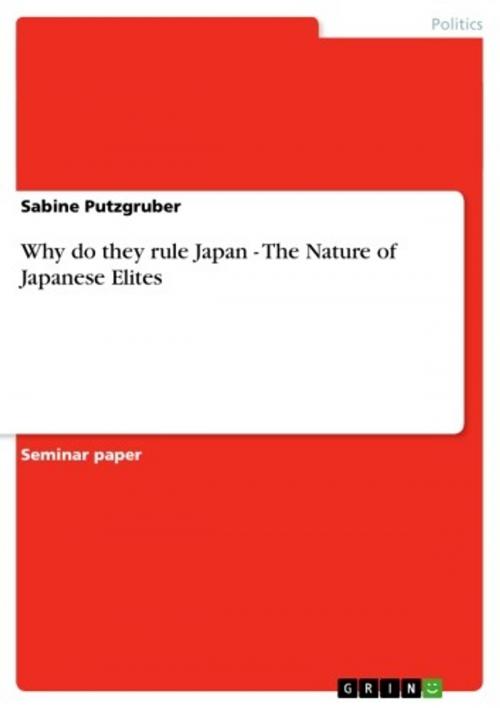Why do they rule Japan - The Nature of Japanese Elites
The Nature of Japanese Elites
Nonfiction, Social & Cultural Studies, Political Science, International, International Relations| Author: | Sabine Putzgruber | ISBN: | 9783638355865 |
| Publisher: | GRIN Publishing | Publication: | March 8, 2005 |
| Imprint: | GRIN Publishing | Language: | English |
| Author: | Sabine Putzgruber |
| ISBN: | 9783638355865 |
| Publisher: | GRIN Publishing |
| Publication: | March 8, 2005 |
| Imprint: | GRIN Publishing |
| Language: | English |
Seminar paper from the year 2003 in the subject Politics - International Politics - Region: Far East, grade: 2, University of Vienna (Institut for Political Sciences), 10 entries in the bibliography, language: English, abstract: In the following pages I will try to examine the nature of Japanese elite´s. It interests me how they are composed, how they work and persist but also why they do the same. For that I will try to look into elite theory from Gaetano Mosca, Vilfredo Pareto, G. Lowell Field and John Higley, C. Wright Mills and Harold D. Lasswell. My aim is to take bricks of their theories out and apply it to the Japanese national elite system. Therefore I will recognize the Iran Triangle of the Political, Corporate and Ministry elite as Harold Kerbo and John A. McKinstry use it (Kerbo/McKinstry 1995). First of all I will define the terms that will be used in this work and then look into the theories of scientists I talked about above. In the next chapter I go right to Japan to get a small insight of the elite-structure there. After examining the Corporate, Ministry and Political Elite separately I look do the factors that hold them t ogether more closely. The education system, social clubs and business organizations as also the very important family connections. With some questions Lasswell asked for his work, I bring in further thoughts as the theory and fact go together. So my questions are what is the elite in Japan? Of what elements does it consists and how does it persist? What's wrong with this democratic system organization, if there is something wrong with it. Is it going to change in the next years or is it likely to persist for a very long time, over generations? Is there a better system for Japan? And what would that be? I can see that this is not going to be a very sorrow study since the work is taking place in the frame of a student seminar but I take it as an opportunity to get at least some insight in the works of those scientists. The part of applying those theories to Japan, a country I studied only for a short time and never have been to, can only be done with the consciousness of labeling it as a students try. Still I hope that some valid thoughts will come out of the following pages and I hopefully will have time to further this study in the future, as it really sounds interesting to me. It took me some time to find the right theme for this seminar work, as I wanted to write on Japanese society but didn't want to cover the exact same things as Prof. Harold Kerbo did in his books 'Modern Japanese Society' (Kerbo/McKinstry 1997) [...]
Seminar paper from the year 2003 in the subject Politics - International Politics - Region: Far East, grade: 2, University of Vienna (Institut for Political Sciences), 10 entries in the bibliography, language: English, abstract: In the following pages I will try to examine the nature of Japanese elite´s. It interests me how they are composed, how they work and persist but also why they do the same. For that I will try to look into elite theory from Gaetano Mosca, Vilfredo Pareto, G. Lowell Field and John Higley, C. Wright Mills and Harold D. Lasswell. My aim is to take bricks of their theories out and apply it to the Japanese national elite system. Therefore I will recognize the Iran Triangle of the Political, Corporate and Ministry elite as Harold Kerbo and John A. McKinstry use it (Kerbo/McKinstry 1995). First of all I will define the terms that will be used in this work and then look into the theories of scientists I talked about above. In the next chapter I go right to Japan to get a small insight of the elite-structure there. After examining the Corporate, Ministry and Political Elite separately I look do the factors that hold them t ogether more closely. The education system, social clubs and business organizations as also the very important family connections. With some questions Lasswell asked for his work, I bring in further thoughts as the theory and fact go together. So my questions are what is the elite in Japan? Of what elements does it consists and how does it persist? What's wrong with this democratic system organization, if there is something wrong with it. Is it going to change in the next years or is it likely to persist for a very long time, over generations? Is there a better system for Japan? And what would that be? I can see that this is not going to be a very sorrow study since the work is taking place in the frame of a student seminar but I take it as an opportunity to get at least some insight in the works of those scientists. The part of applying those theories to Japan, a country I studied only for a short time and never have been to, can only be done with the consciousness of labeling it as a students try. Still I hope that some valid thoughts will come out of the following pages and I hopefully will have time to further this study in the future, as it really sounds interesting to me. It took me some time to find the right theme for this seminar work, as I wanted to write on Japanese society but didn't want to cover the exact same things as Prof. Harold Kerbo did in his books 'Modern Japanese Society' (Kerbo/McKinstry 1997) [...]















